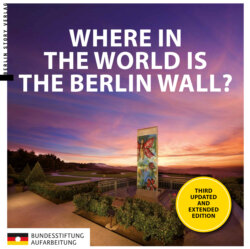Читать книгу Where in the World is the Berlin Wall? - Группа авторов - Страница 22
На сайте Литреса книга снята с продажи.
FROM 9TH-13TH AUGUST
ОглавлениеDuring his welcome speech at a commemoration service in the Bundestag in 1996, Rainer Eppelmann used these words to justify the committee’s decision to use the 35th anniversary of the building of the Wall as an opportunity to both remember and to dedicate a number of events to it. Now another 25 years later, the memory of the building of the Wall and life in the divided city and a divided world has reclaimed its place not just in the city’s memory. Moreover, in the 50th year after the Wall was built, remembering the period around its construction received greater attention in research and from the media than the uprisings of 17th June 1953.
The actual division of the city had been relegated to second place on the city’s self-image agenda years before, but the situation seemed to have changed by the 50th anniversary of the building of the Wall. One sign was that the lead-up to the anniversary had pushed other events into the background of public discourse. It was also now apparent that the “demolition of the Wall”, particularly in the first years after the fall of the Wall, led to new demands for its reconstruction of the Wall in order to make it possible to “experience history”, as called for by the former governing mayor of Berlin, Eberhard Diepgen.3
Despite various ideas of how to keep the memory of the Wall and the division alive, it seems as though the city has found its way back to its traumatic history after 20 years. Forgotten are the first 15 years after the Fall of the Wall which were characterised by the attempts to completely eradicate all traces of the construction and the division of the city which lasted 28 years. Before this, commemorating the Wall had only been a topic for victim’s associations, private societies and a few concerned citizens. Whilst public events mainly celebrated the Fall of the Wall, public attention only turned to the 13th of August by way of detour on the 9th of November. The joy and euphoria over the fall of the Wall, coupled with the nostalgia that emerged in the 1990s, seemed to obscure the fact that what was brought down in November 1989 was a dictatorship that denied its citizens basic human rights and had those who tried to flee the sealed-off country shot or given long prison sentences.
